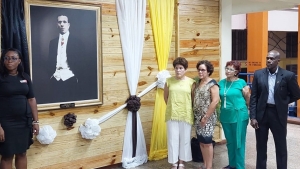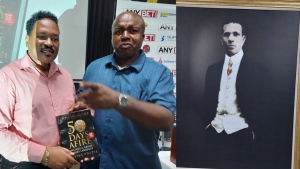G.C. Foster could take his rightful place as the father of Jamaica’s strong legacy in track and field following the launch of 50 Days Afire at the sports college named in his honour in St Catherine, Jamaica on Thursday night.
50 Days Afire chronicles 50 track and field performances that shaped Jamaica’s legacy in the sport as well as the lost story of Foster, who after being unable to compete at the Olympics in 1908, proceeded to defeat many of the finalists of the 100m in subsequent meets across Europe.
At the launch, a short documentary ‘Finding Foster’ that highlighted the long-buried legacy of GC Foster, was shown to a captive audience.
Following years of research and interviews by authors Michael A. Grant and Hubert Lawrence Foster to life and documented seminal moments in the country's long and storied history in track and field. Grant and Lawrence said the information contained in the book could or perhaps should change the narrative about who really set the pace for what Jamaica has been able to accomplish through the likes of Herb McKenley, Merlene Ottey, Marilyn Neufville, Usain Bolt, Shelly-Ann Fraser-Pryce and Elaine Thompson-Herah among many others.
“I hope so,” said Lawrence, the noted track writer and historian, “it’s an inspiring story. If you could take off with no Olympic Committee, thinking you could beat the best, is typical Jamaican. My parents did that. I am who I am because my parents made those choices and GC Foster exemplifies that spirit that can’t be broken.
“He came back, didn’t make it but put that into coaching and Jamaica is better for it. I hope so.”
Both men agree that producing the book helped them understand how the events they wrote about helped shape Jamaica’s track and field history but that realization did not come about until they were well into the process.
“Once I got about half-way it occurred to me that these 50 events actually changed Jamaica. If you remove them and they never happened it would be a very different country, not just in terms of sport but also in terms of the culture itself,” Grant opined.
Lawrence though had a different take. “If we can avoid the mistakes of the past by showing the victories of the past then it’s like a torch light showing people where to go,” he said.
“People now know that there was greatness all the way through the history back to 1908 and they trust it if they work hard and they work smart they can win.”
On the evening, a portrait of GC Foster was unveiled at the school's auditorium as his grand-daughters Andrea Roberts, Debbie Jardine and Heather Chin looked on.
Deon Hemmings, the first Jamaican woman to win an Olympic gold medal, when she ran a record 52.82 to defeat the more fancied Americans Kim Batten and Tonja Buford, at the Atlanta Games in 1996, was also honoured with artwork by Patrick Kitson over a citation recalling her history-making exploits.
, could change the narrative that Arthur Wint, Herb McKenley, George Rhoden and Les Laing, are the fathers of Jamaica’s strong track and field legacy.
that chronicles 50 track and field performances that shaped Jamaica’s legacy in the sport, believe that the unearthing of the accomplishments of





























